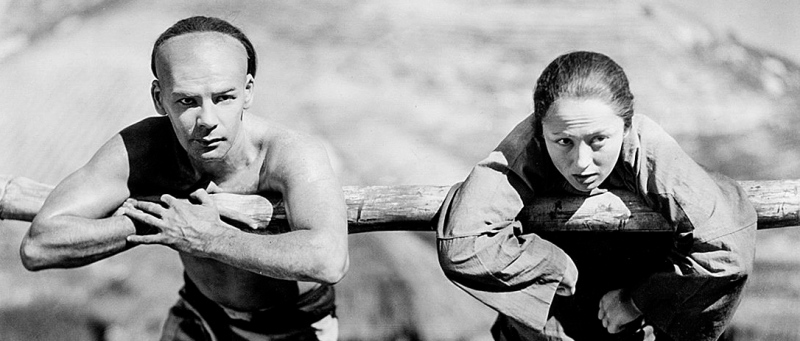Film review by Jason Day of The Good Earth, based on the novel by Pearl Buck, about turn of the century peasants in China. Starring Paul Muni and Oscar winning Luise Rainer.
Historical/Period/Epic
To like this post, comment on it or follow this blog, please scroll to the bottom. Use the search function on the left of the screen to look for other reviews and updates.
Synopsis
Based on the novel by Pearl Buck, this film charts the life of Wang-Lun (Paul Muni) a poor but hardworking what farmer in turn of the century China, who marries kitchen slave O-Lan (Luise Rainer). They are both hard-working and O-Lan accepts her life of servitude, submissive to her husband. She bears him two sons and a daughter and tills the land. When famine threatens to destroy them, she moves their family to the big city where they work as beggars to ensure they don’t have to see their prized land to satisfy their lazy, greedy Uncle (Walter Connolly). They move back home and, after many negotiations, Wang-Lun establishes himself as a prosperous businessman and takes a second, much younger Bride. The beautiful Lotus (Tilly Losch) struggles to find her place in this established family but they are all tested when a plague of locusts threatens everything Wang-Lun and O-Lan have established.
Review, by Jason Day
What constitutes ‘racist’ cinema?
Is it the blockbusting, rabble-rousing, Ku Klux Klan membership encouraging The Birth of a Nation (2015) with its giddying depictions of white actors in black-face make-up running amok in post-Civil War America, hell bent on nothing more than raping wilting white ladies and sitting in Congress with their feet on the desks?
Or the equally blockbusting, romantic Civil War epic Gone With the Wind (1939) with its more genteel representation of servile black people (played by actual people) and perfume scented depiction of this the antebellum period of America as missed and fleetingly ‘gone with the wind’ itself?
Perhaps it is more subtle than that; despite its pretentions, more modern race relations dramas such as The Help (20111) and The Butler (2013), despite being more ‘right on’ and progressive with their politics, only seem able to do this by relying on the history-honoured, servile nature of non-white people to make a social point.
The Good Earth, the mighty, multi-million dollar epic cinema adaption of the Pearl S. Buck novel that was the brain-child of multi-million dollar movie impresario Irving Thalberg’s final production (though he didn’t realise it; he died before the movie was finished) can be added to this discussion.
A film about Chinese peasants in turn of the century China, the principal roles are all filled by caucasian actors, two of them (Rainer and Losch) being Austrian. They all have pale faces and, most embarrassingly (at least to modern viewers) feature heavy eye make-up to ‘Asian-ise’ them.
Such films are divisive to watch in the 21st century and, for a reviewer, difficult to praise for their relative cinematic worth, given their decidedly un-PC stance.
I don’t agree the casting here as there were good, Chinese actors performing in American movies who could have easily essayed these performances (Sessue Hayakawa and Anna May Wong to name the biggest two).
But we have to see such productions in context. In 1936, when this movie was being prepared, blockbuster American movies were directed squarely at the social and political orthodoxy, namely white Americans. It was not unusual to see such actors cast in the roles of non-white Americans.
Paul Muni and Luise Rainer, both white and big name actors at the time (both had recently won Academy Awards for appealing and tremulous performances), were actually good choices for these roles, within that prejudiced, but accepted, movie production system of the time.
Despite Muni’s wooden, heavy turn as Wang-Lun, an almost mute Rainer nabs the acting honours as his much put upon wife, eventually killed by the hardships of life. Her frail, pallid, high cheek-boned features perfectly suit the part of O-Lan, the wife who is as good as the earth that frames the narrative.
Rainer is the ‘Gaia’ of Thalberg’s spectacle, more than repaying the producer’s faith in her. Despite her lack of ‘Oriental’ looks, there is something in her porcelain pallor that befits this role.
She declined it originally but accepted on his insistence, which, ironically, destroyed her career. The public and critics, who had rejoiced in her chatty, effervescent turn in The Great Ziegfeld (1936), that netted her first Best Actress Oscar, turned a cold shoulder to her after she won again, the first instance of concurret Oscar wins.
After a few more paltry roles in American films, her Hollywood career was over and she became the greatest casualty of Oscar success. She didn’t act again in movies until The Gambler (1997).
However, what the coaching and diction lessons she was given do not hide is her heavy Austrian accent. “Shay is a feemale chy-uld. With Smawl-pox!” she intones at one point, in cloying, gravely teutonic tones.
There are some spectacular set-pieces, most notably the raid on the Governor’s house that sees O-Lan almost trampled to death and the locust plague. Director Franklin injects some pretty harsh images (dead people half buried in the unrelenting sands whipped up by the barren land; skeletons and dead dogs being picked at by vultures) that is a surprise the censor passed the film uncut, but good that they did. It leavens the high melodrama.
Cast & credits
Director: Sidney Franklin. (Uncredited Victor Fleming, Gustav Machaty, Sam Wood). 138mins. MGM. (U).
Producer: Irving Thalberg.
Writers: Talbot Jennings, Tess Slesinger, Claudine West.
Camera: Karl Freund.
Music: Herbert Stothart.
Sets: Cedric Gibbons.
Paul Muni, Luise Rainer, Walter Connolly, Tilly Losch, Charley Grapewin, Jessie Ralph, Soo Yung, Keye Luke, Roland Lui, Suzanna Kim, Ching Wah Lee, Harold Huber.



